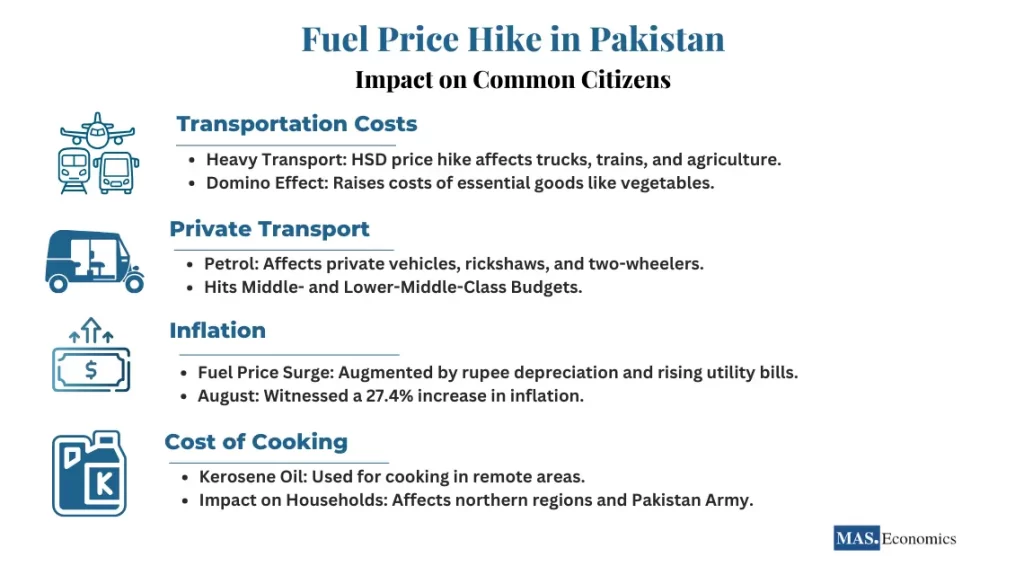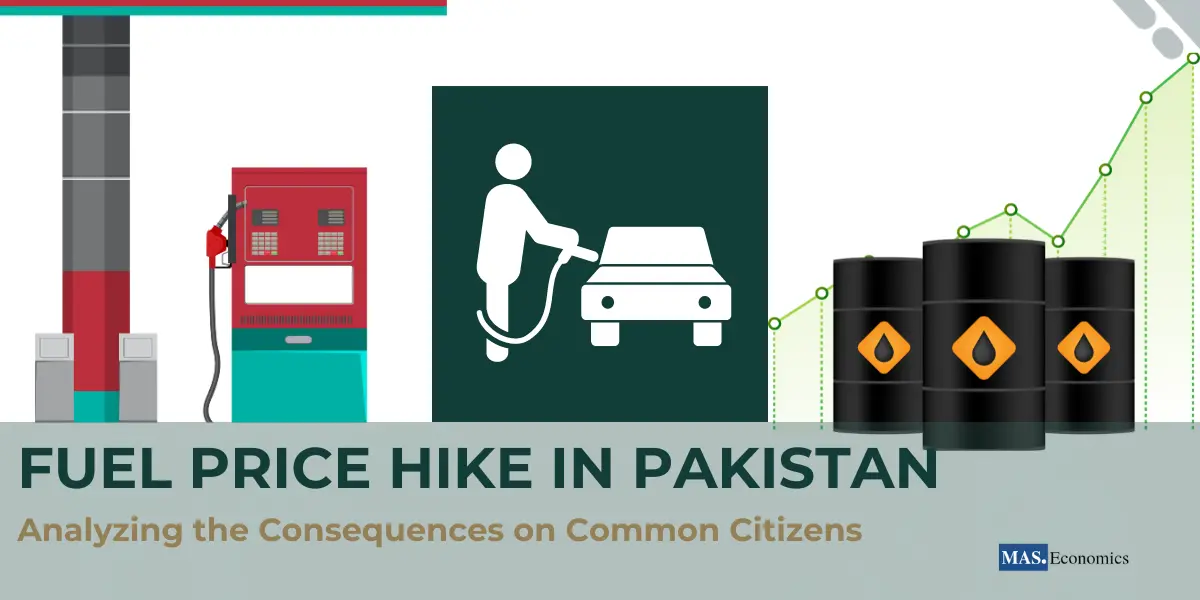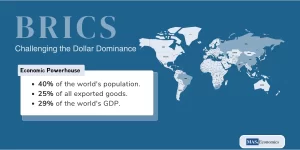Welcome to MASEconomics, your reliable source for insightful analyses of economic developments. Pakistan, like many nations, grapples with the complexities of fuel price fluctuations and their profound effects on the economy and citizens. In a recent move, Pakistan’s interim government raised petrol and high-speed diesel (HSD) prices, setting off ripples throughout the nation.
The decision, driven by the escalating trend of petroleum prices in the international market, has pushed petrol prices to an all-time high of Rs331.38 per liter and HSD to Rs329.18 per liter.

Understanding the Price Hike
This is not the first time Pakistan has witnessed a surge in fuel prices. On September 1, the interim government approved significant increases in petrol and diesel rates, sending petrol prices above the historic Rs300 per liter threshold for the first time in the nation’s history. This recent hike is part of a series of measures to meet the terms of a $3 billion standby agreement with the International Monetary Fund (IMF).
Impact on Common Citizens
The consequences of these price hikes are far-reaching, affecting various segments of society.

Transportation Costs
High-speed diesel (HSD) is a primary fuel for heavy transport vehicles, including trucks, buses, and cargo vehicles. When its price increases, the operating costs for businesses using these vehicles rise significantly. These increased costs are often passed on to consumers in the form of higher prices for transported goods.
The railway industry heavily relies on diesel for locomotives. An increase in diesel prices can lead to higher transportation costs for goods and passengers using trains. This can affect industries that rely on railways for moving raw materials and finished products.
Diesel engines power many agricultural machines, such as tractors, combine harvesters, and irrigation pumps. Farmers bear the brunt of diesel price hikes as it directly impacts their cost of production. This, in turn, can lead to higher prices for agricultural products like grains, vegetables, and fruits.
The ripple effect of increased transportation costs extends to essential goods like vegetables and food items. As transportation expenses rise, the prices of these goods also increase. This inflation in food prices can burden households and affect their purchasing power.
Impact on Private Transport
Petrol is the primary fuel for private vehicles, including cars, motorcycles, and rickshaws. When petrol prices surge, it directly affects the budgets of middle-class and lower-middle-class citizens who rely on these forms of transportation for their daily commute.
Many people in Pakistan depend on rickshaws and two-wheelers for affordable transportation. These vehicles are typically less fuel-efficient, so a petrol price increase places additional financial strain on those who use them.
Inflation
The recent surge in fuel prices, coupled with other economic challenges like rupee depreciation and rising utility bills, contributes to soaring inflation rates. August saw a staggering 27.4% increase in inflation, and this fuel price hike will have a lag effect on general prices in the country in the coming days and weeks.
Cost of Cooking
Kerosene Oil Usage: In remote areas of Pakistan where liquefied petroleum gas (LPG) is unavailable or less accessible, people rely on kerosene oil for cooking. This includes regions in northern Pakistan. Additionally, the Pakistan Army uses kerosene oil for various purposes in these areas.
An increase in kerosene oil prices directly affects households in these regions, particularly those with limited access to alternative cooking fuels. Higher kerosene oil prices mean increased expenses for cooking, which can strain household budgets.
The rise in cooking fuel costs can have broader economic and social implications, including potential food price increases, especially in areas where kerosene is a common cooking fuel.
Long-Term Benefits and Implications
While the immediate impact of the fuel price hike is undoubtedly challenging for the common citizens, it’s essential to consider the potential long-term benefits and implications:
International Market Dynamics
Fuel prices in Pakistan are influenced by international oil price trends. The prices of crude oil, which is the primary raw material for petrol and diesel, fluctuate based on global supply and demand dynamics, geopolitical events, and production decisions by major oil-producing countries.
The value of the Pakistani rupee in relation to the US dollar also plays a role in determining fuel prices. A stronger rupee can help offset rising global oil prices to some extent, making fuel more affordable for consumers in Pakistan.
While a stronger rupee can have a positive effect on fuel prices, it’s important to note that currency exchange rates can be volatile and subject to various economic and geopolitical factors. Therefore, the impact of exchange rate changes on fuel prices may not be a long-term solution to price stability.
Fiscal Responsibility
Historically, governments in Pakistan and many other countries have subsidized fuel prices to keep them artificially low. While this approach may provide short-term relief to consumers, it places a significant burden on the government’s budget. Subsidies require government spending, which can lead to budget deficits and, in the long run, fiscal challenges.
Instead of addressing the root causes of economic challenges, subsidies often shift the financial burden to future generations. This approach may provide temporary relief, but it can lead to more significant economic problems down the road.
Transitioning away from fuel subsidies is a complex process that requires careful planning and gradual adjustments. It involves implementing targeted social safety nets to protect vulnerable populations while gradually reducing subsidies to improve fiscal responsibility.
Meeting IMF Obligations
The IMF loan program, despite imposing short-term hardships, has prevented a sovereign debt default in Pakistan. Such defaults can have catastrophic consequences for a country’s economy, including reduced access to international credit markets and further economic instability.
The conditions attached to the IMF bailout program include various economic reforms aimed at addressing structural issues in Pakistan’s economy. These reforms are seen as essential for long-term economic stability, including reducing fiscal deficits, improving tax collection, and enhancing transparency in economic management.
The challenge for policymakers is to balance the short-term difficulties faced by citizens due to measures like fuel price hikes with the long-term benefits of economic stability. Effective communication and well-designed policies are crucial to ensure that the burden is shared equitably and that vulnerable populations are protected during these transitions.
Conclusion
Pakistan’s recent fuel price hike is undeniably burdensome for the common citizens, particularly given the prevailing economic challenges. However, it’s crucial to recognize that these measures are part of a broader strategy to stabilize the economy and meet international obligations. As Pakistan steers these challenges, focusing on fiscal responsibility and addressing long-term economic issues will be critical for the country’s future prosperity.
Stay informed, stay ahead, and keep learning with MASEconomics!




